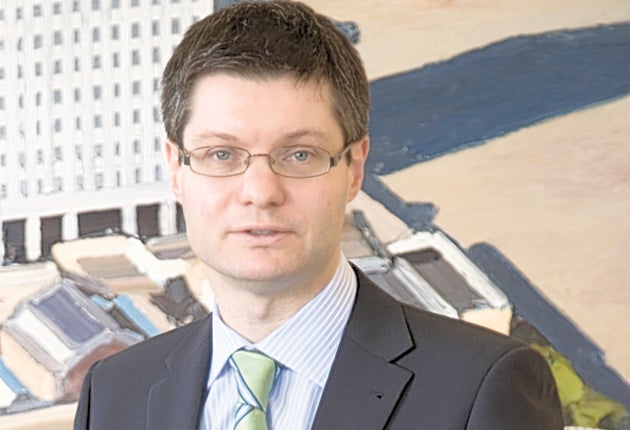New politics, old habits as Tory donors head to the House of Lords

Two major donors to the Conservative Party have been handed places in the House of Lords as part of an honours list that will see the creation of 56 new peers.
More than £500,000 has been handed to the party by Dolar Popat, a multi-millionaire business tycoon, and Simon Wolfson, chief executive of the clothing chain Next. Both are now heading to the Lords. The peerages have emerged as David Cameron prepares to make a series of policy announcements that will highlight his championing of "government transparency".
The peerage handed to Mr Wolfson will cause disquiet as the Next boss was understood to be pivotal in encouraging business figures to sign a letter opposing Labour's plan to increase National Insurance. The letter, released during the election campaign, provided a major boost for the Tories. He has also given the party £293,000 since 2006.
Mr Popat, 55, who was born in Uganda, has built up a business empire thought to be worth £42m. His firm, the TLC Group, owns a string of care homes and hotels across Britain. He has handed Mr Cameron's party donations worth £219,700.
It has also emerged that, on the eve of the election, the Tories received large donations from the wives of two controversial Middle Eastern businessmen linked to arms deals. Data from the Electoral Commission showed May Makhzoumi gave the Tories £50,000 a week before the election. Her billionaire Lebanese husband, Fouad, was involved in deal for the sale of military equipment with the former Tory defence minister, Jonathan Aitken who subsequently sued for libel over various matters including the reporting of this deal and was jailed for perjury.
Another donation of £50,000 was recorded a week earlier from Rosemary Said, the wife of Wafic Said. Mr Said was linked to a deal between BAE and Saudi Arabia, which was investigated by the Serious Fraud Office following allegations of bribery. Tony Blair stopped the probe in 2006. Mr Said, born in Syria, is barred from making donations to British political parties as he is not deemed to be a British resident. He has denied distributing commissions to members of the Saudi royal family.
The peerages for Mr Wolfson and Mr Popat are bound to reignite anger over the handing of honours to major party donors and undermine the "new politics" which the coalition government has claimed to represent. Mr Wolfson, who has advised the Chancellor, George Osborne, also donated to Mr Cameron's leadership campaign. Mr Popat has helped bankroll Tory frontbenchers such as Andrew Mitchell, the International Development Secretary, Baroness Warsi, the Tory party chairman, and Nick Herbert, the Minister for Policing. He has given the Tories cash donations worth £196,000 and sponsorship worth £23,000 since 2004.
Elsewhere, senior Labour figures from both the Blairite and Brownite wings of the party were given peerages. John Prescott, the former deputy prime minister who has at times frowned upon the appointment of Lords, has been given a peerage. The former MP, famed for his no-nonsense style, once revealed that his wife, Pauline, was keen for him to take up a peerage if offered. "I'm against too much flunkery and titles. But Pauline would like me to," he said.
Gordon Brown has used the dissolution honours list to ensure many of his closest allies will be filling the Lords benches. A peerage has been handed to Sue Nye, his long-serving gatekeeper wrongly blamed for the disastrous "bigotgate" fiasco. Mr Brown incorrectly thought it had been Ms Nye, who is married to former BBC chair Gavyn Davies, who had set up a meeting with Labour voter, Gillian Duffy. Mr Brown was later taped calling Mrs Duffy a "bigoted woman".
Among his other allies to be ennobled were the former MPs Michael Wills, Des Browne, John McFall and Angela Smith. Wilf Stevenson, his close friend since his days at Edinburgh University, also received a peerage. Mr Stevenson later became the former prime minster's special adviser. The former defence minister, Quentin Davies, has been rewarded for his decision to defect from the Tories to Labour three years ago with a seat in the Lords.
Sir Ian Blair, the former Metropolitan Police commissioner, is another controversial selection by Mr Brown. Sir Ian was removed from Scotland Yard by the Tory Mayor, Boris Johnson. The most infamous episode in his tenure came on 22 July 2005, when Jean Charles de Menezes was shot dead by officers who had mistaken him for a suicide bomber.
As expected, Helen Newlove, the widow of a man who was kicked to death by a drunken gang, has been given a place on the Tory benches. Mr Cameron is said to have been impressed by her tireless campaign against binge drinking and gang culture in Britain since her husband, Garry, was killed in 2007.
Join our commenting forum
Join thought-provoking conversations, follow other Independent readers and see their replies
Comments